Whistle-Blower Claims Accounting Shenanigans at SuccessFactors: A Case Study
VerifiedAdded on 2023/06/07
|13
|2923
|494
AI Summary
This case study explores the alleged improper accounting at SuccessFactors and offers recommendations to reduce improper accounting of multiyear contracts. It also discusses the reporting of non-GAAP financial measures and its usefulness to investors.
Contribute Materials
Your contribution can guide someone’s learning journey. Share your
documents today.
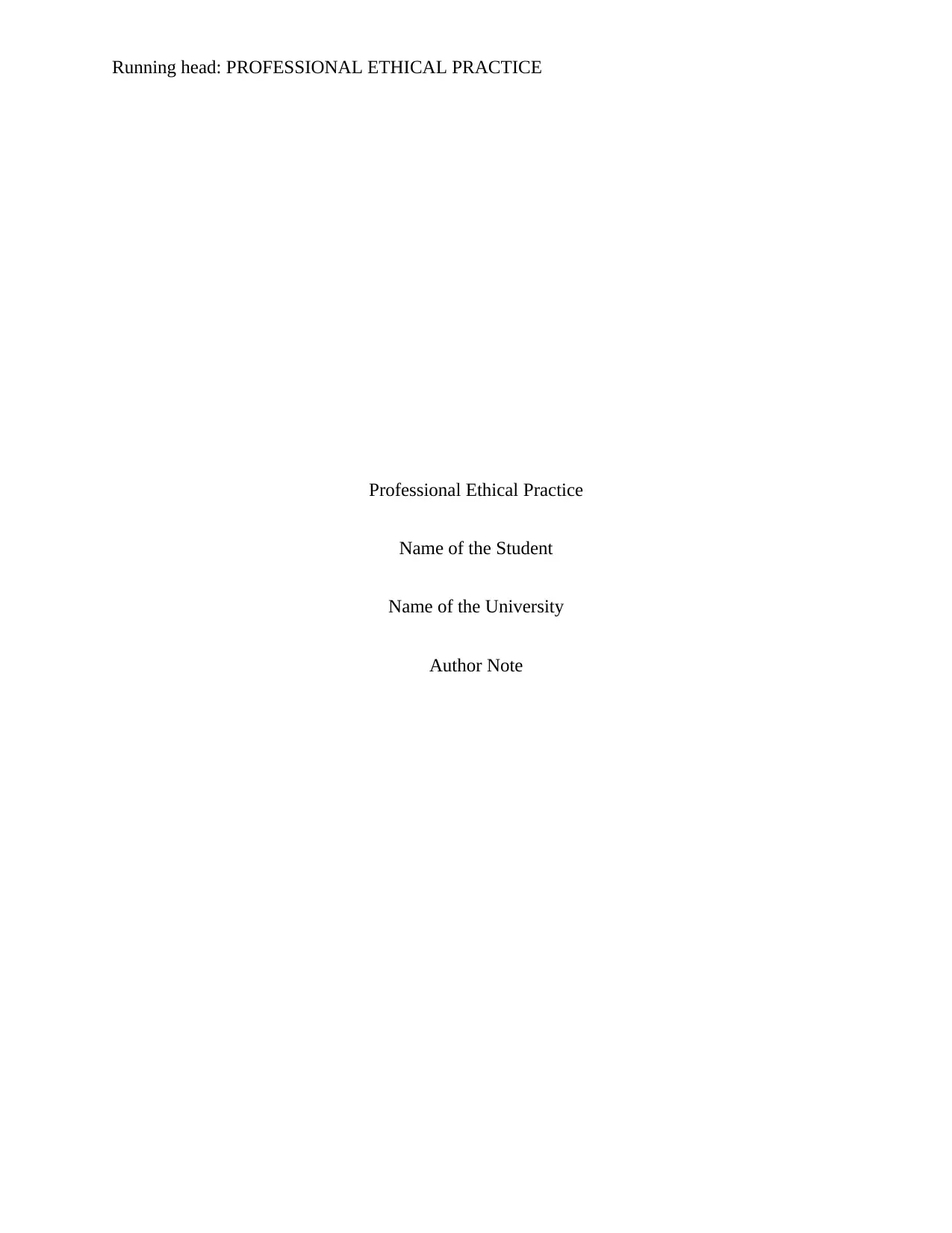
Running head: PROFESSIONAL ETHICAL PRACTICE
Professional Ethical Practice
Name of the Student
Name of the University
Author Note
Professional Ethical Practice
Name of the Student
Name of the University
Author Note
Secure Best Marks with AI Grader
Need help grading? Try our AI Grader for instant feedback on your assignments.
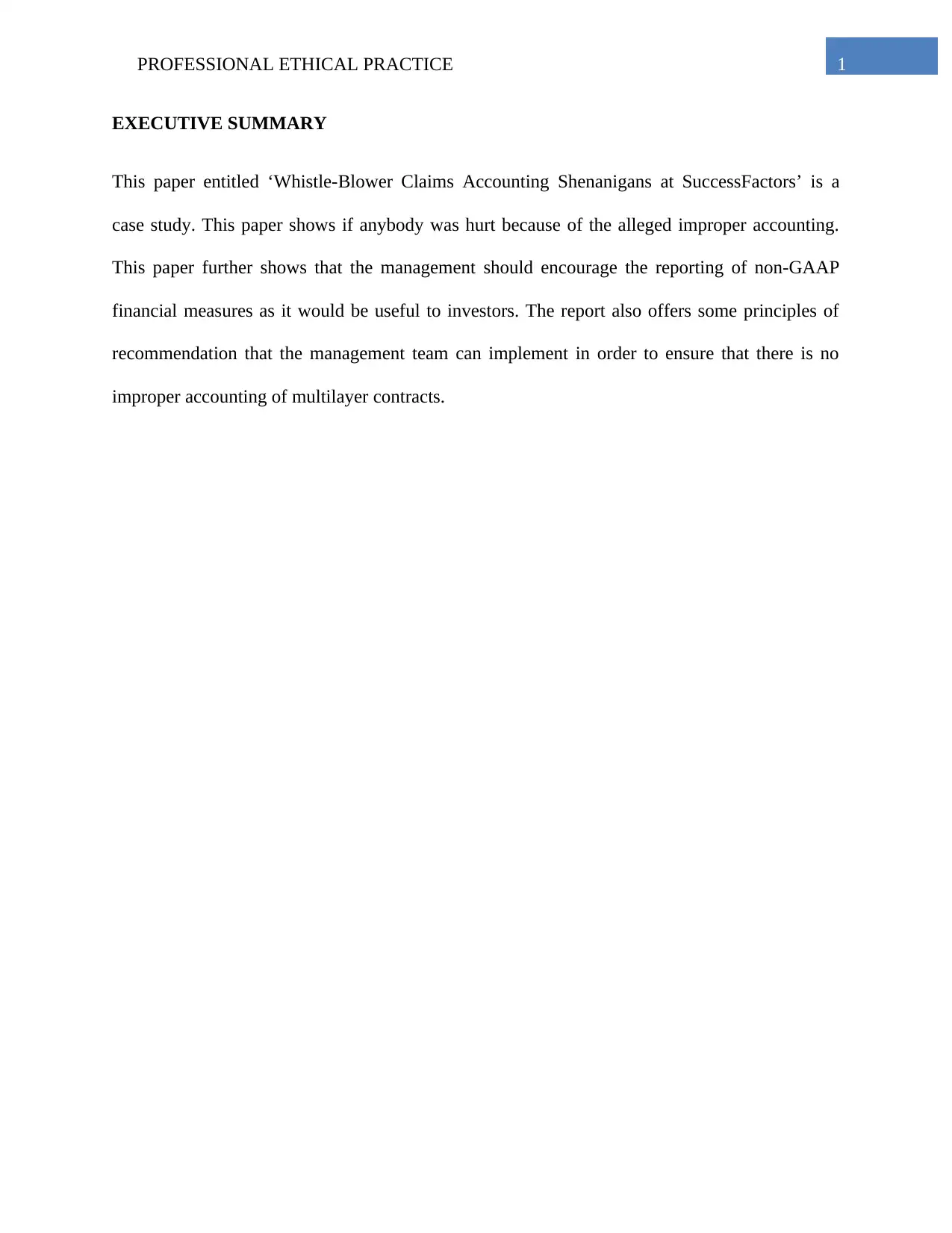
1PROFESSIONAL ETHICAL PRACTICE
EXECUTIVE SUMMARY
This paper entitled ‘Whistle-Blower Claims Accounting Shenanigans at SuccessFactors’ is a
case study. This paper shows if anybody was hurt because of the alleged improper accounting.
This paper further shows that the management should encourage the reporting of non-GAAP
financial measures as it would be useful to investors. The report also offers some principles of
recommendation that the management team can implement in order to ensure that there is no
improper accounting of multilayer contracts.
EXECUTIVE SUMMARY
This paper entitled ‘Whistle-Blower Claims Accounting Shenanigans at SuccessFactors’ is a
case study. This paper shows if anybody was hurt because of the alleged improper accounting.
This paper further shows that the management should encourage the reporting of non-GAAP
financial measures as it would be useful to investors. The report also offers some principles of
recommendation that the management team can implement in order to ensure that there is no
improper accounting of multilayer contracts.
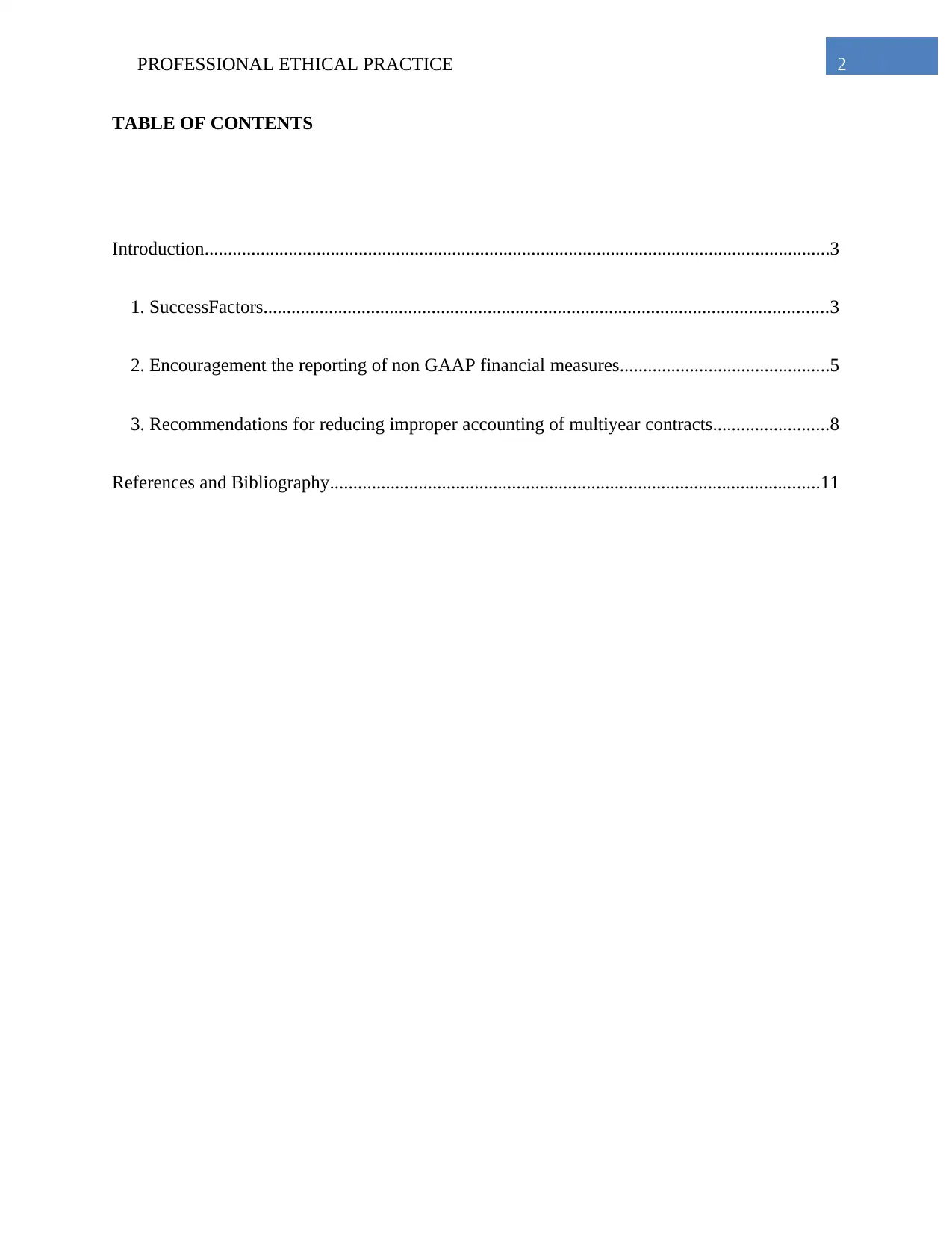
2PROFESSIONAL ETHICAL PRACTICE
TABLE OF CONTENTS
Introduction......................................................................................................................................3
1. SuccessFactors.........................................................................................................................3
2. Encouragement the reporting of non GAAP financial measures.............................................5
3. Recommendations for reducing improper accounting of multiyear contracts.........................8
References and Bibliography.........................................................................................................11
TABLE OF CONTENTS
Introduction......................................................................................................................................3
1. SuccessFactors.........................................................................................................................3
2. Encouragement the reporting of non GAAP financial measures.............................................5
3. Recommendations for reducing improper accounting of multiyear contracts.........................8
References and Bibliography.........................................................................................................11
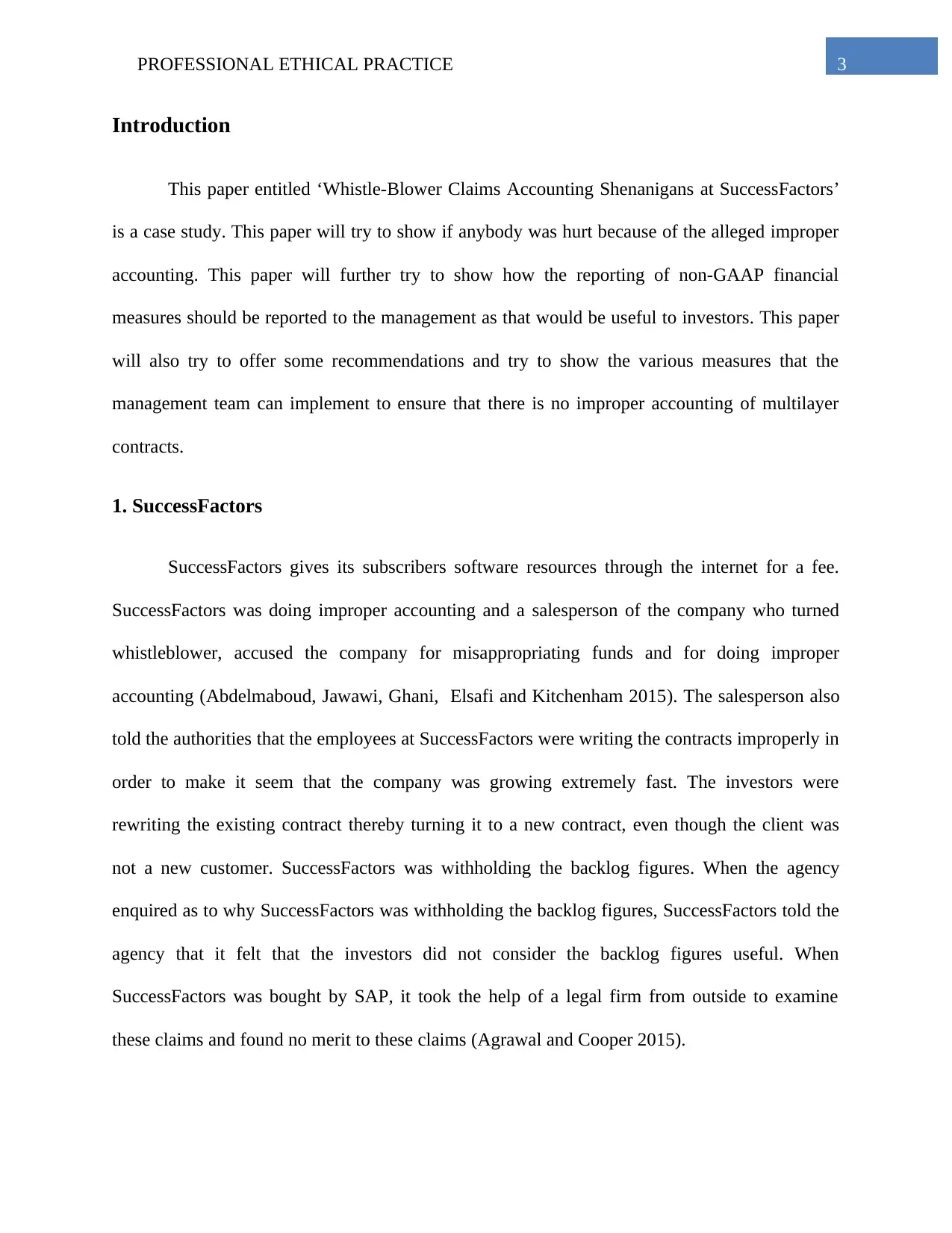
3PROFESSIONAL ETHICAL PRACTICE
Introduction
This paper entitled ‘Whistle-Blower Claims Accounting Shenanigans at SuccessFactors’
is a case study. This paper will try to show if anybody was hurt because of the alleged improper
accounting. This paper will further try to show how the reporting of non-GAAP financial
measures should be reported to the management as that would be useful to investors. This paper
will also try to offer some recommendations and try to show the various measures that the
management team can implement to ensure that there is no improper accounting of multilayer
contracts.
1. SuccessFactors
SuccessFactors gives its subscribers software resources through the internet for a fee.
SuccessFactors was doing improper accounting and a salesperson of the company who turned
whistleblower, accused the company for misappropriating funds and for doing improper
accounting (Abdelmaboud, Jawawi, Ghani, Elsafi and Kitchenham 2015). The salesperson also
told the authorities that the employees at SuccessFactors were writing the contracts improperly in
order to make it seem that the company was growing extremely fast. The investors were
rewriting the existing contract thereby turning it to a new contract, even though the client was
not a new customer. SuccessFactors was withholding the backlog figures. When the agency
enquired as to why SuccessFactors was withholding the backlog figures, SuccessFactors told the
agency that it felt that the investors did not consider the backlog figures useful. When
SuccessFactors was bought by SAP, it took the help of a legal firm from outside to examine
these claims and found no merit to these claims (Agrawal and Cooper 2015).
Introduction
This paper entitled ‘Whistle-Blower Claims Accounting Shenanigans at SuccessFactors’
is a case study. This paper will try to show if anybody was hurt because of the alleged improper
accounting. This paper will further try to show how the reporting of non-GAAP financial
measures should be reported to the management as that would be useful to investors. This paper
will also try to offer some recommendations and try to show the various measures that the
management team can implement to ensure that there is no improper accounting of multilayer
contracts.
1. SuccessFactors
SuccessFactors gives its subscribers software resources through the internet for a fee.
SuccessFactors was doing improper accounting and a salesperson of the company who turned
whistleblower, accused the company for misappropriating funds and for doing improper
accounting (Abdelmaboud, Jawawi, Ghani, Elsafi and Kitchenham 2015). The salesperson also
told the authorities that the employees at SuccessFactors were writing the contracts improperly in
order to make it seem that the company was growing extremely fast. The investors were
rewriting the existing contract thereby turning it to a new contract, even though the client was
not a new customer. SuccessFactors was withholding the backlog figures. When the agency
enquired as to why SuccessFactors was withholding the backlog figures, SuccessFactors told the
agency that it felt that the investors did not consider the backlog figures useful. When
SuccessFactors was bought by SAP, it took the help of a legal firm from outside to examine
these claims and found no merit to these claims (Agrawal and Cooper 2015).
Secure Best Marks with AI Grader
Need help grading? Try our AI Grader for instant feedback on your assignments.
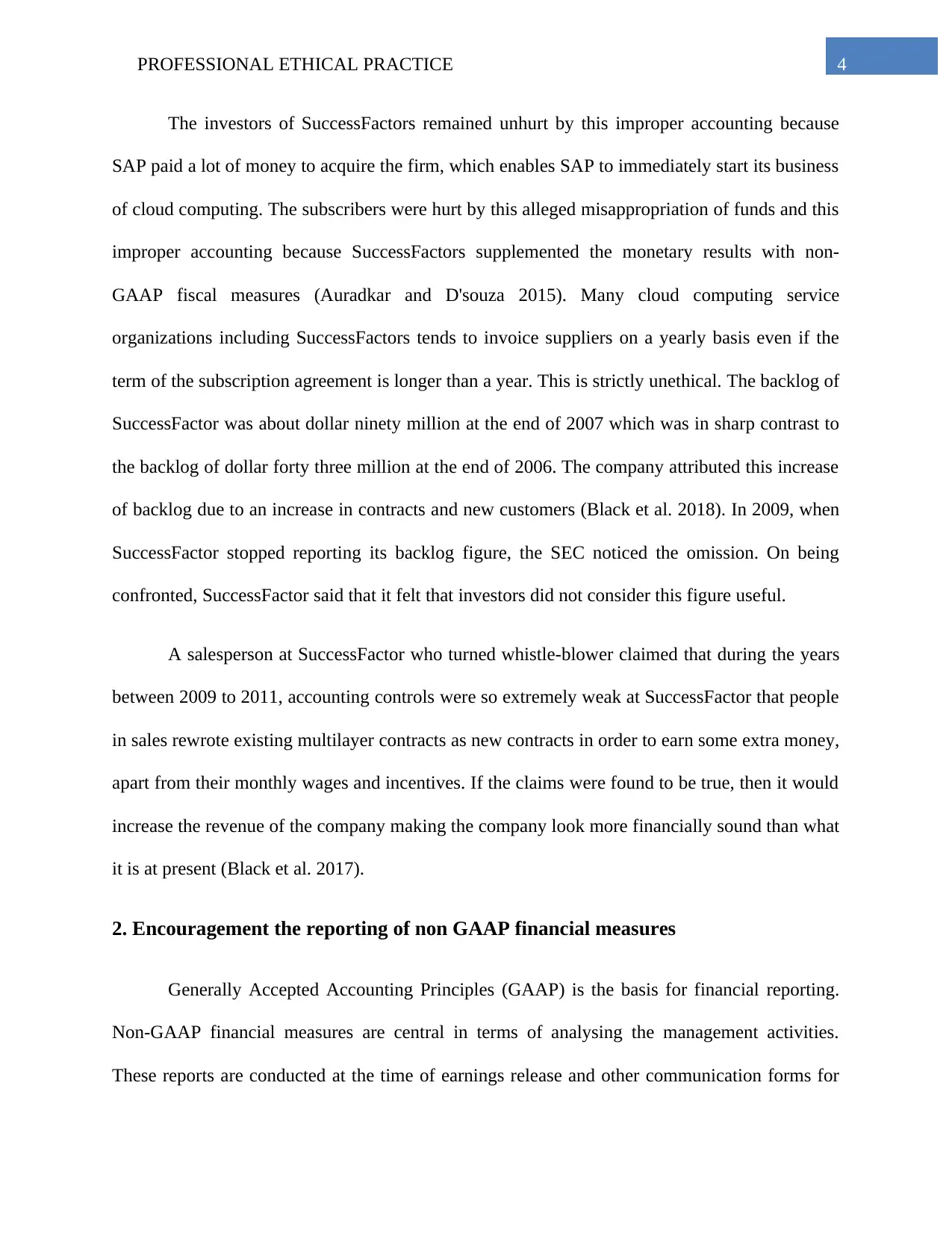
4PROFESSIONAL ETHICAL PRACTICE
The investors of SuccessFactors remained unhurt by this improper accounting because
SAP paid a lot of money to acquire the firm, which enables SAP to immediately start its business
of cloud computing. The subscribers were hurt by this alleged misappropriation of funds and this
improper accounting because SuccessFactors supplemented the monetary results with non-
GAAP fiscal measures (Auradkar and D'souza 2015). Many cloud computing service
organizations including SuccessFactors tends to invoice suppliers on a yearly basis even if the
term of the subscription agreement is longer than a year. This is strictly unethical. The backlog of
SuccessFactor was about dollar ninety million at the end of 2007 which was in sharp contrast to
the backlog of dollar forty three million at the end of 2006. The company attributed this increase
of backlog due to an increase in contracts and new customers (Black et al. 2018). In 2009, when
SuccessFactor stopped reporting its backlog figure, the SEC noticed the omission. On being
confronted, SuccessFactor said that it felt that investors did not consider this figure useful.
A salesperson at SuccessFactor who turned whistle-blower claimed that during the years
between 2009 to 2011, accounting controls were so extremely weak at SuccessFactor that people
in sales rewrote existing multilayer contracts as new contracts in order to earn some extra money,
apart from their monthly wages and incentives. If the claims were found to be true, then it would
increase the revenue of the company making the company look more financially sound than what
it is at present (Black et al. 2017).
2. Encouragement the reporting of non GAAP financial measures
Generally Accepted Accounting Principles (GAAP) is the basis for financial reporting.
Non-GAAP financial measures are central in terms of analysing the management activities.
These reports are conducted at the time of earnings release and other communication forms for
The investors of SuccessFactors remained unhurt by this improper accounting because
SAP paid a lot of money to acquire the firm, which enables SAP to immediately start its business
of cloud computing. The subscribers were hurt by this alleged misappropriation of funds and this
improper accounting because SuccessFactors supplemented the monetary results with non-
GAAP fiscal measures (Auradkar and D'souza 2015). Many cloud computing service
organizations including SuccessFactors tends to invoice suppliers on a yearly basis even if the
term of the subscription agreement is longer than a year. This is strictly unethical. The backlog of
SuccessFactor was about dollar ninety million at the end of 2007 which was in sharp contrast to
the backlog of dollar forty three million at the end of 2006. The company attributed this increase
of backlog due to an increase in contracts and new customers (Black et al. 2018). In 2009, when
SuccessFactor stopped reporting its backlog figure, the SEC noticed the omission. On being
confronted, SuccessFactor said that it felt that investors did not consider this figure useful.
A salesperson at SuccessFactor who turned whistle-blower claimed that during the years
between 2009 to 2011, accounting controls were so extremely weak at SuccessFactor that people
in sales rewrote existing multilayer contracts as new contracts in order to earn some extra money,
apart from their monthly wages and incentives. If the claims were found to be true, then it would
increase the revenue of the company making the company look more financially sound than what
it is at present (Black et al. 2017).
2. Encouragement the reporting of non GAAP financial measures
Generally Accepted Accounting Principles (GAAP) is the basis for financial reporting.
Non-GAAP financial measures are central in terms of analysing the management activities.
These reports are conducted at the time of earnings release and other communication forms for
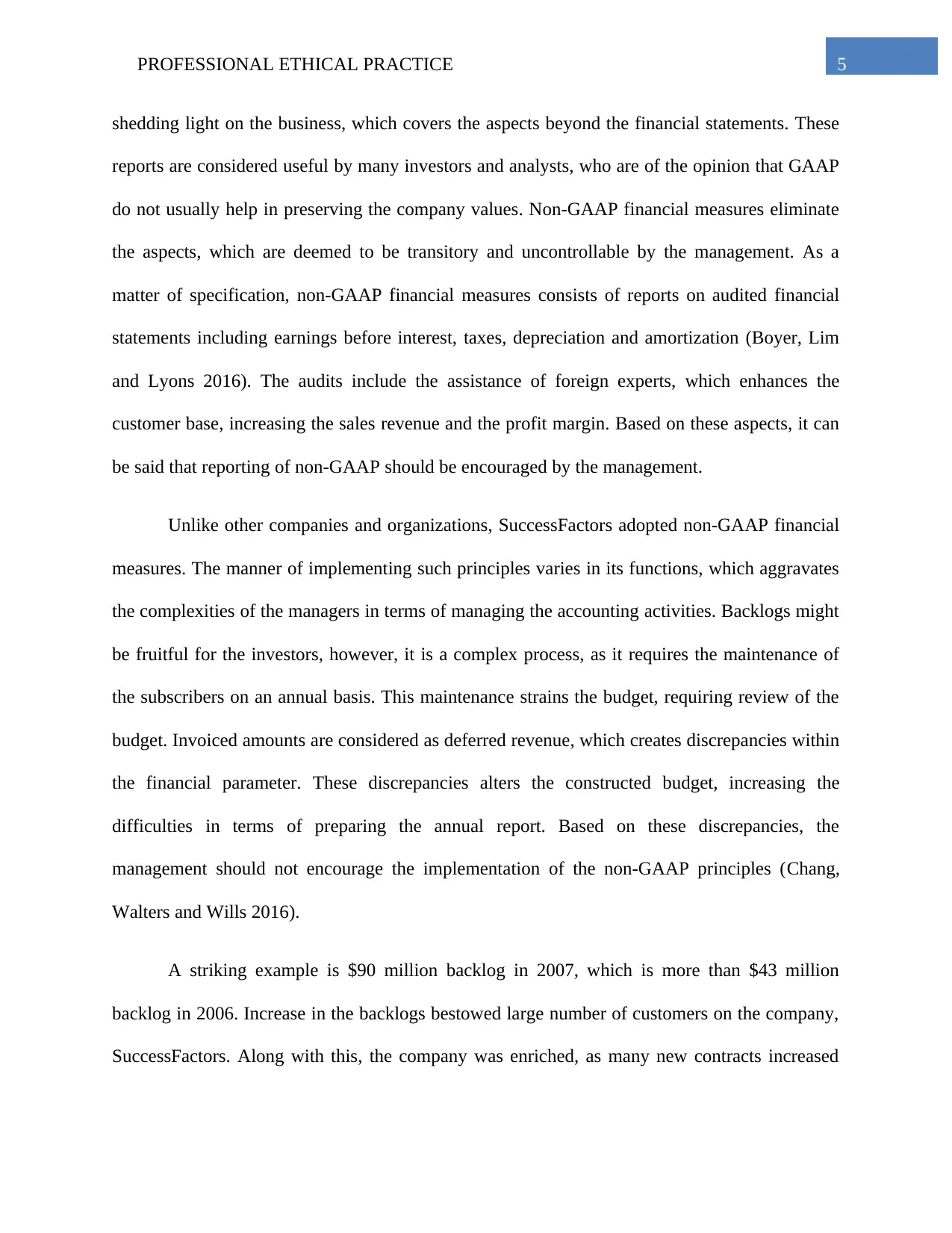
5PROFESSIONAL ETHICAL PRACTICE
shedding light on the business, which covers the aspects beyond the financial statements. These
reports are considered useful by many investors and analysts, who are of the opinion that GAAP
do not usually help in preserving the company values. Non-GAAP financial measures eliminate
the aspects, which are deemed to be transitory and uncontrollable by the management. As a
matter of specification, non-GAAP financial measures consists of reports on audited financial
statements including earnings before interest, taxes, depreciation and amortization (Boyer, Lim
and Lyons 2016). The audits include the assistance of foreign experts, which enhances the
customer base, increasing the sales revenue and the profit margin. Based on these aspects, it can
be said that reporting of non-GAAP should be encouraged by the management.
Unlike other companies and organizations, SuccessFactors adopted non-GAAP financial
measures. The manner of implementing such principles varies in its functions, which aggravates
the complexities of the managers in terms of managing the accounting activities. Backlogs might
be fruitful for the investors, however, it is a complex process, as it requires the maintenance of
the subscribers on an annual basis. This maintenance strains the budget, requiring review of the
budget. Invoiced amounts are considered as deferred revenue, which creates discrepancies within
the financial parameter. These discrepancies alters the constructed budget, increasing the
difficulties in terms of preparing the annual report. Based on these discrepancies, the
management should not encourage the implementation of the non-GAAP principles (Chang,
Walters and Wills 2016).
A striking example is $90 million backlog in 2007, which is more than $43 million
backlog in 2006. Increase in the backlogs bestowed large number of customers on the company,
SuccessFactors. Along with this, the company was enriched, as many new contracts increased
shedding light on the business, which covers the aspects beyond the financial statements. These
reports are considered useful by many investors and analysts, who are of the opinion that GAAP
do not usually help in preserving the company values. Non-GAAP financial measures eliminate
the aspects, which are deemed to be transitory and uncontrollable by the management. As a
matter of specification, non-GAAP financial measures consists of reports on audited financial
statements including earnings before interest, taxes, depreciation and amortization (Boyer, Lim
and Lyons 2016). The audits include the assistance of foreign experts, which enhances the
customer base, increasing the sales revenue and the profit margin. Based on these aspects, it can
be said that reporting of non-GAAP should be encouraged by the management.
Unlike other companies and organizations, SuccessFactors adopted non-GAAP financial
measures. The manner of implementing such principles varies in its functions, which aggravates
the complexities of the managers in terms of managing the accounting activities. Backlogs might
be fruitful for the investors, however, it is a complex process, as it requires the maintenance of
the subscribers on an annual basis. This maintenance strains the budget, requiring review of the
budget. Invoiced amounts are considered as deferred revenue, which creates discrepancies within
the financial parameter. These discrepancies alters the constructed budget, increasing the
difficulties in terms of preparing the annual report. Based on these discrepancies, the
management should not encourage the implementation of the non-GAAP principles (Chang,
Walters and Wills 2016).
A striking example is $90 million backlog in 2007, which is more than $43 million
backlog in 2006. Increase in the backlogs bestowed large number of customers on the company,
SuccessFactors. Along with this, the company was enriched, as many new contracts increased
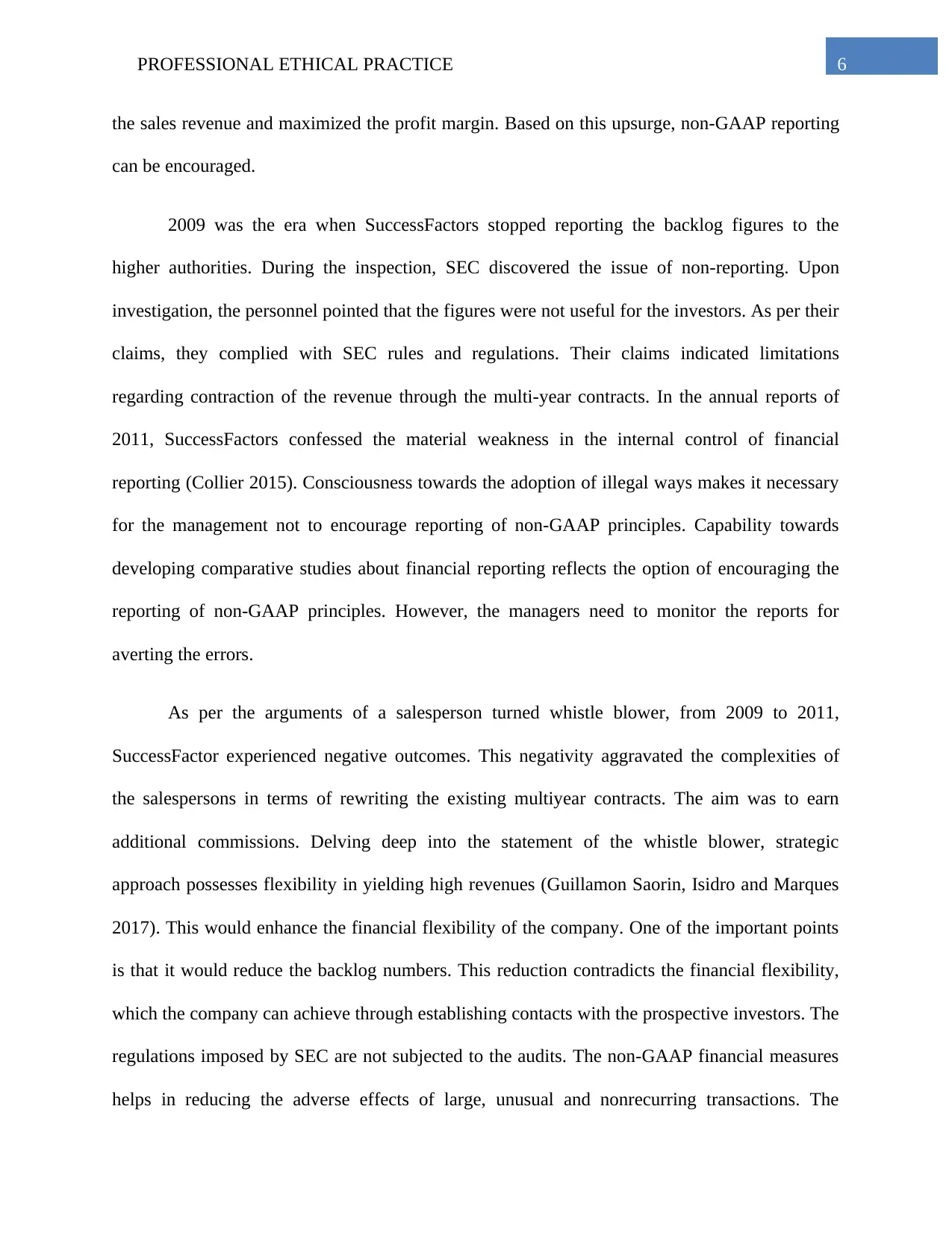
6PROFESSIONAL ETHICAL PRACTICE
the sales revenue and maximized the profit margin. Based on this upsurge, non-GAAP reporting
can be encouraged.
2009 was the era when SuccessFactors stopped reporting the backlog figures to the
higher authorities. During the inspection, SEC discovered the issue of non-reporting. Upon
investigation, the personnel pointed that the figures were not useful for the investors. As per their
claims, they complied with SEC rules and regulations. Their claims indicated limitations
regarding contraction of the revenue through the multi-year contracts. In the annual reports of
2011, SuccessFactors confessed the material weakness in the internal control of financial
reporting (Collier 2015). Consciousness towards the adoption of illegal ways makes it necessary
for the management not to encourage reporting of non-GAAP principles. Capability towards
developing comparative studies about financial reporting reflects the option of encouraging the
reporting of non-GAAP principles. However, the managers need to monitor the reports for
averting the errors.
As per the arguments of a salesperson turned whistle blower, from 2009 to 2011,
SuccessFactor experienced negative outcomes. This negativity aggravated the complexities of
the salespersons in terms of rewriting the existing multiyear contracts. The aim was to earn
additional commissions. Delving deep into the statement of the whistle blower, strategic
approach possesses flexibility in yielding high revenues (Guillamon Saorin, Isidro and Marques
2017). This would enhance the financial flexibility of the company. One of the important points
is that it would reduce the backlog numbers. This reduction contradicts the financial flexibility,
which the company can achieve through establishing contacts with the prospective investors. The
regulations imposed by SEC are not subjected to the audits. The non-GAAP financial measures
helps in reducing the adverse effects of large, unusual and nonrecurring transactions. The
the sales revenue and maximized the profit margin. Based on this upsurge, non-GAAP reporting
can be encouraged.
2009 was the era when SuccessFactors stopped reporting the backlog figures to the
higher authorities. During the inspection, SEC discovered the issue of non-reporting. Upon
investigation, the personnel pointed that the figures were not useful for the investors. As per their
claims, they complied with SEC rules and regulations. Their claims indicated limitations
regarding contraction of the revenue through the multi-year contracts. In the annual reports of
2011, SuccessFactors confessed the material weakness in the internal control of financial
reporting (Collier 2015). Consciousness towards the adoption of illegal ways makes it necessary
for the management not to encourage reporting of non-GAAP principles. Capability towards
developing comparative studies about financial reporting reflects the option of encouraging the
reporting of non-GAAP principles. However, the managers need to monitor the reports for
averting the errors.
As per the arguments of a salesperson turned whistle blower, from 2009 to 2011,
SuccessFactor experienced negative outcomes. This negativity aggravated the complexities of
the salespersons in terms of rewriting the existing multiyear contracts. The aim was to earn
additional commissions. Delving deep into the statement of the whistle blower, strategic
approach possesses flexibility in yielding high revenues (Guillamon Saorin, Isidro and Marques
2017). This would enhance the financial flexibility of the company. One of the important points
is that it would reduce the backlog numbers. This reduction contradicts the financial flexibility,
which the company can achieve through establishing contacts with the prospective investors. The
regulations imposed by SEC are not subjected to the audits. The non-GAAP financial measures
helps in reducing the adverse effects of large, unusual and nonrecurring transactions. The
Paraphrase This Document
Need a fresh take? Get an instant paraphrase of this document with our AI Paraphraser
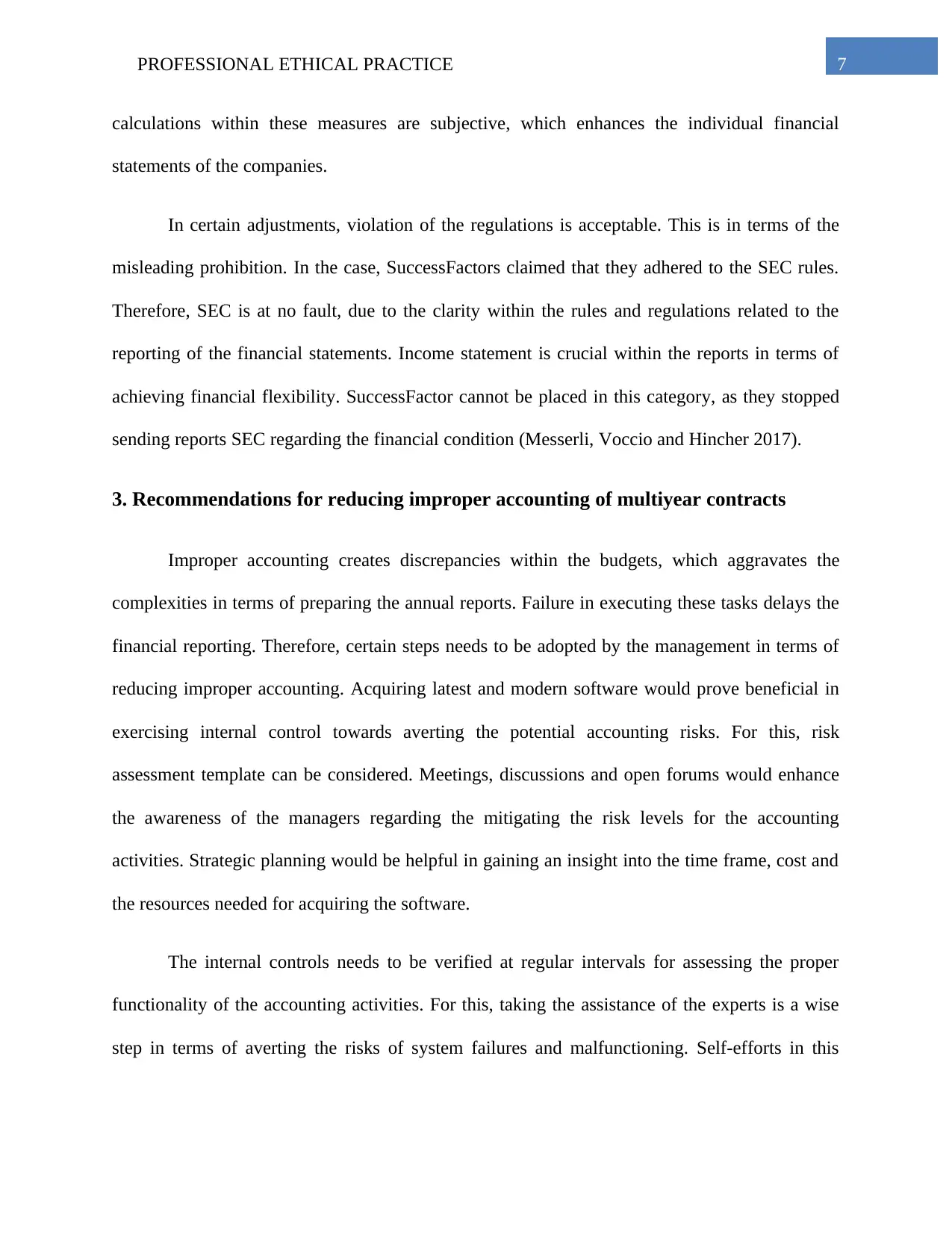
7PROFESSIONAL ETHICAL PRACTICE
calculations within these measures are subjective, which enhances the individual financial
statements of the companies.
In certain adjustments, violation of the regulations is acceptable. This is in terms of the
misleading prohibition. In the case, SuccessFactors claimed that they adhered to the SEC rules.
Therefore, SEC is at no fault, due to the clarity within the rules and regulations related to the
reporting of the financial statements. Income statement is crucial within the reports in terms of
achieving financial flexibility. SuccessFactor cannot be placed in this category, as they stopped
sending reports SEC regarding the financial condition (Messerli, Voccio and Hincher 2017).
3. Recommendations for reducing improper accounting of multiyear contracts
Improper accounting creates discrepancies within the budgets, which aggravates the
complexities in terms of preparing the annual reports. Failure in executing these tasks delays the
financial reporting. Therefore, certain steps needs to be adopted by the management in terms of
reducing improper accounting. Acquiring latest and modern software would prove beneficial in
exercising internal control towards averting the potential accounting risks. For this, risk
assessment template can be considered. Meetings, discussions and open forums would enhance
the awareness of the managers regarding the mitigating the risk levels for the accounting
activities. Strategic planning would be helpful in gaining an insight into the time frame, cost and
the resources needed for acquiring the software.
The internal controls needs to be verified at regular intervals for assessing the proper
functionality of the accounting activities. For this, taking the assistance of the experts is a wise
step in terms of averting the risks of system failures and malfunctioning. Self-efforts in this
calculations within these measures are subjective, which enhances the individual financial
statements of the companies.
In certain adjustments, violation of the regulations is acceptable. This is in terms of the
misleading prohibition. In the case, SuccessFactors claimed that they adhered to the SEC rules.
Therefore, SEC is at no fault, due to the clarity within the rules and regulations related to the
reporting of the financial statements. Income statement is crucial within the reports in terms of
achieving financial flexibility. SuccessFactor cannot be placed in this category, as they stopped
sending reports SEC regarding the financial condition (Messerli, Voccio and Hincher 2017).
3. Recommendations for reducing improper accounting of multiyear contracts
Improper accounting creates discrepancies within the budgets, which aggravates the
complexities in terms of preparing the annual reports. Failure in executing these tasks delays the
financial reporting. Therefore, certain steps needs to be adopted by the management in terms of
reducing improper accounting. Acquiring latest and modern software would prove beneficial in
exercising internal control towards averting the potential accounting risks. For this, risk
assessment template can be considered. Meetings, discussions and open forums would enhance
the awareness of the managers regarding the mitigating the risk levels for the accounting
activities. Strategic planning would be helpful in gaining an insight into the time frame, cost and
the resources needed for acquiring the software.
The internal controls needs to be verified at regular intervals for assessing the proper
functionality of the accounting activities. For this, taking the assistance of the experts is a wise
step in terms of averting the risks of system failures and malfunctioning. Self-efforts in this
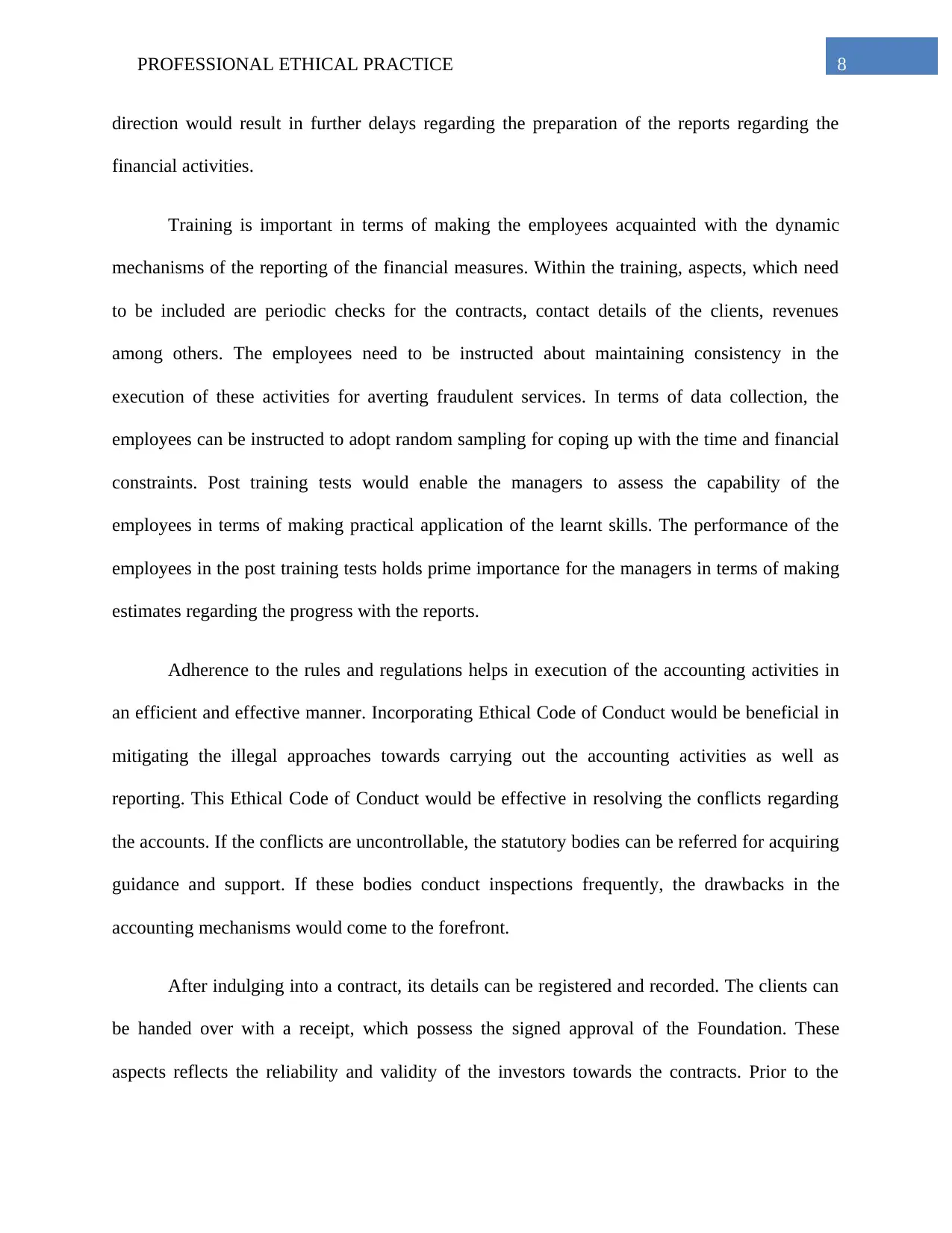
8PROFESSIONAL ETHICAL PRACTICE
direction would result in further delays regarding the preparation of the reports regarding the
financial activities.
Training is important in terms of making the employees acquainted with the dynamic
mechanisms of the reporting of the financial measures. Within the training, aspects, which need
to be included are periodic checks for the contracts, contact details of the clients, revenues
among others. The employees need to be instructed about maintaining consistency in the
execution of these activities for averting fraudulent services. In terms of data collection, the
employees can be instructed to adopt random sampling for coping up with the time and financial
constraints. Post training tests would enable the managers to assess the capability of the
employees in terms of making practical application of the learnt skills. The performance of the
employees in the post training tests holds prime importance for the managers in terms of making
estimates regarding the progress with the reports.
Adherence to the rules and regulations helps in execution of the accounting activities in
an efficient and effective manner. Incorporating Ethical Code of Conduct would be beneficial in
mitigating the illegal approaches towards carrying out the accounting activities as well as
reporting. This Ethical Code of Conduct would be effective in resolving the conflicts regarding
the accounts. If the conflicts are uncontrollable, the statutory bodies can be referred for acquiring
guidance and support. If these bodies conduct inspections frequently, the drawbacks in the
accounting mechanisms would come to the forefront.
After indulging into a contract, its details can be registered and recorded. The clients can
be handed over with a receipt, which possess the signed approval of the Foundation. These
aspects reflects the reliability and validity of the investors towards the contracts. Prior to the
direction would result in further delays regarding the preparation of the reports regarding the
financial activities.
Training is important in terms of making the employees acquainted with the dynamic
mechanisms of the reporting of the financial measures. Within the training, aspects, which need
to be included are periodic checks for the contracts, contact details of the clients, revenues
among others. The employees need to be instructed about maintaining consistency in the
execution of these activities for averting fraudulent services. In terms of data collection, the
employees can be instructed to adopt random sampling for coping up with the time and financial
constraints. Post training tests would enable the managers to assess the capability of the
employees in terms of making practical application of the learnt skills. The performance of the
employees in the post training tests holds prime importance for the managers in terms of making
estimates regarding the progress with the reports.
Adherence to the rules and regulations helps in execution of the accounting activities in
an efficient and effective manner. Incorporating Ethical Code of Conduct would be beneficial in
mitigating the illegal approaches towards carrying out the accounting activities as well as
reporting. This Ethical Code of Conduct would be effective in resolving the conflicts regarding
the accounts. If the conflicts are uncontrollable, the statutory bodies can be referred for acquiring
guidance and support. If these bodies conduct inspections frequently, the drawbacks in the
accounting mechanisms would come to the forefront.
After indulging into a contract, its details can be registered and recorded. The clients can
be handed over with a receipt, which possess the signed approval of the Foundation. These
aspects reflects the reliability and validity of the investors towards the contracts. Prior to the
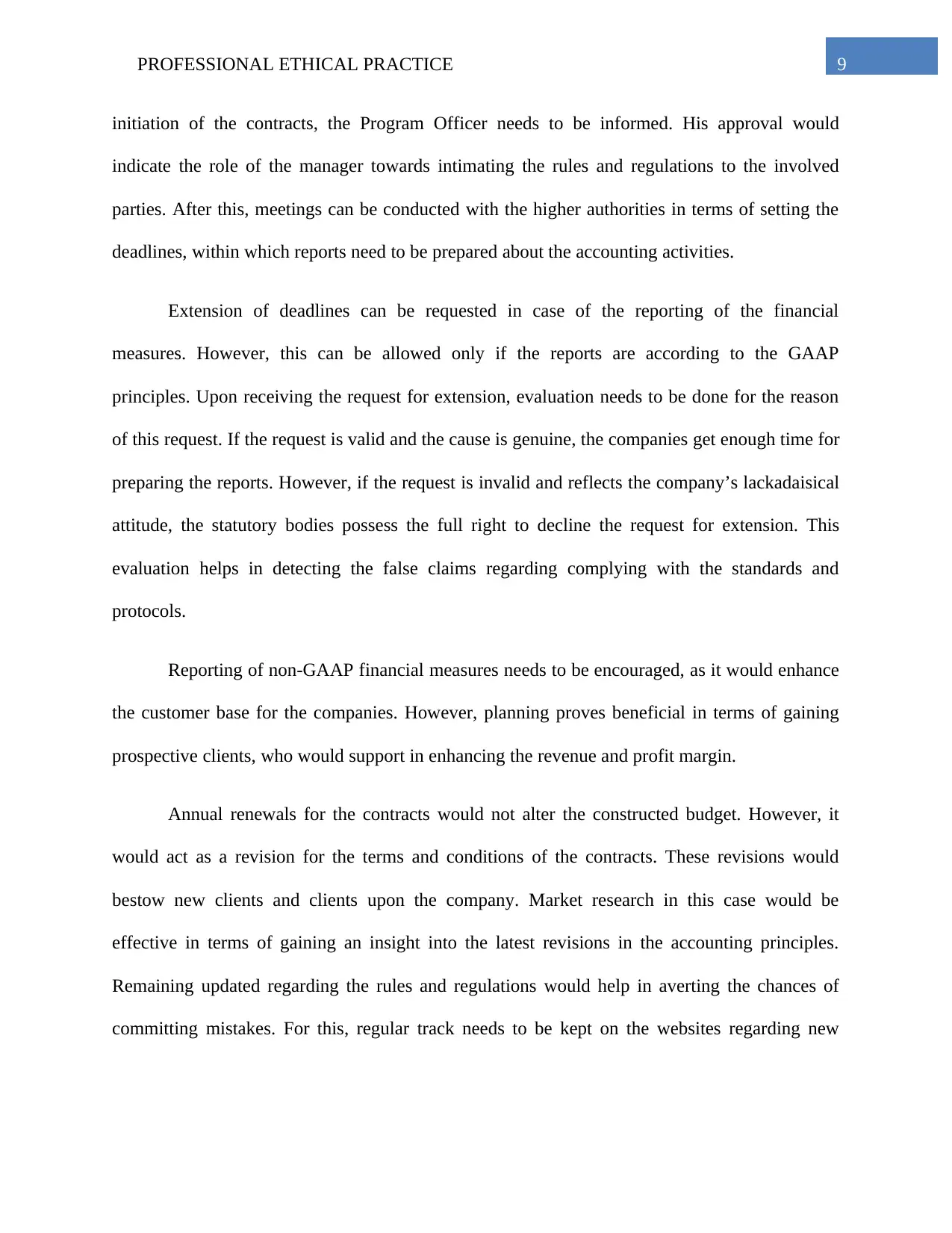
9PROFESSIONAL ETHICAL PRACTICE
initiation of the contracts, the Program Officer needs to be informed. His approval would
indicate the role of the manager towards intimating the rules and regulations to the involved
parties. After this, meetings can be conducted with the higher authorities in terms of setting the
deadlines, within which reports need to be prepared about the accounting activities.
Extension of deadlines can be requested in case of the reporting of the financial
measures. However, this can be allowed only if the reports are according to the GAAP
principles. Upon receiving the request for extension, evaluation needs to be done for the reason
of this request. If the request is valid and the cause is genuine, the companies get enough time for
preparing the reports. However, if the request is invalid and reflects the company’s lackadaisical
attitude, the statutory bodies possess the full right to decline the request for extension. This
evaluation helps in detecting the false claims regarding complying with the standards and
protocols.
Reporting of non-GAAP financial measures needs to be encouraged, as it would enhance
the customer base for the companies. However, planning proves beneficial in terms of gaining
prospective clients, who would support in enhancing the revenue and profit margin.
Annual renewals for the contracts would not alter the constructed budget. However, it
would act as a revision for the terms and conditions of the contracts. These revisions would
bestow new clients and clients upon the company. Market research in this case would be
effective in terms of gaining an insight into the latest revisions in the accounting principles.
Remaining updated regarding the rules and regulations would help in averting the chances of
committing mistakes. For this, regular track needs to be kept on the websites regarding new
initiation of the contracts, the Program Officer needs to be informed. His approval would
indicate the role of the manager towards intimating the rules and regulations to the involved
parties. After this, meetings can be conducted with the higher authorities in terms of setting the
deadlines, within which reports need to be prepared about the accounting activities.
Extension of deadlines can be requested in case of the reporting of the financial
measures. However, this can be allowed only if the reports are according to the GAAP
principles. Upon receiving the request for extension, evaluation needs to be done for the reason
of this request. If the request is valid and the cause is genuine, the companies get enough time for
preparing the reports. However, if the request is invalid and reflects the company’s lackadaisical
attitude, the statutory bodies possess the full right to decline the request for extension. This
evaluation helps in detecting the false claims regarding complying with the standards and
protocols.
Reporting of non-GAAP financial measures needs to be encouraged, as it would enhance
the customer base for the companies. However, planning proves beneficial in terms of gaining
prospective clients, who would support in enhancing the revenue and profit margin.
Annual renewals for the contracts would not alter the constructed budget. However, it
would act as a revision for the terms and conditions of the contracts. These revisions would
bestow new clients and clients upon the company. Market research in this case would be
effective in terms of gaining an insight into the latest revisions in the accounting principles.
Remaining updated regarding the rules and regulations would help in averting the chances of
committing mistakes. For this, regular track needs to be kept on the websites regarding new
Secure Best Marks with AI Grader
Need help grading? Try our AI Grader for instant feedback on your assignments.

10PROFESSIONAL ETHICAL PRACTICE
updates. Negligence in this aspect would add vulnerability into the position of companies like
SuccessFactor in terms of financial reporting.
updates. Negligence in this aspect would add vulnerability into the position of companies like
SuccessFactor in terms of financial reporting.
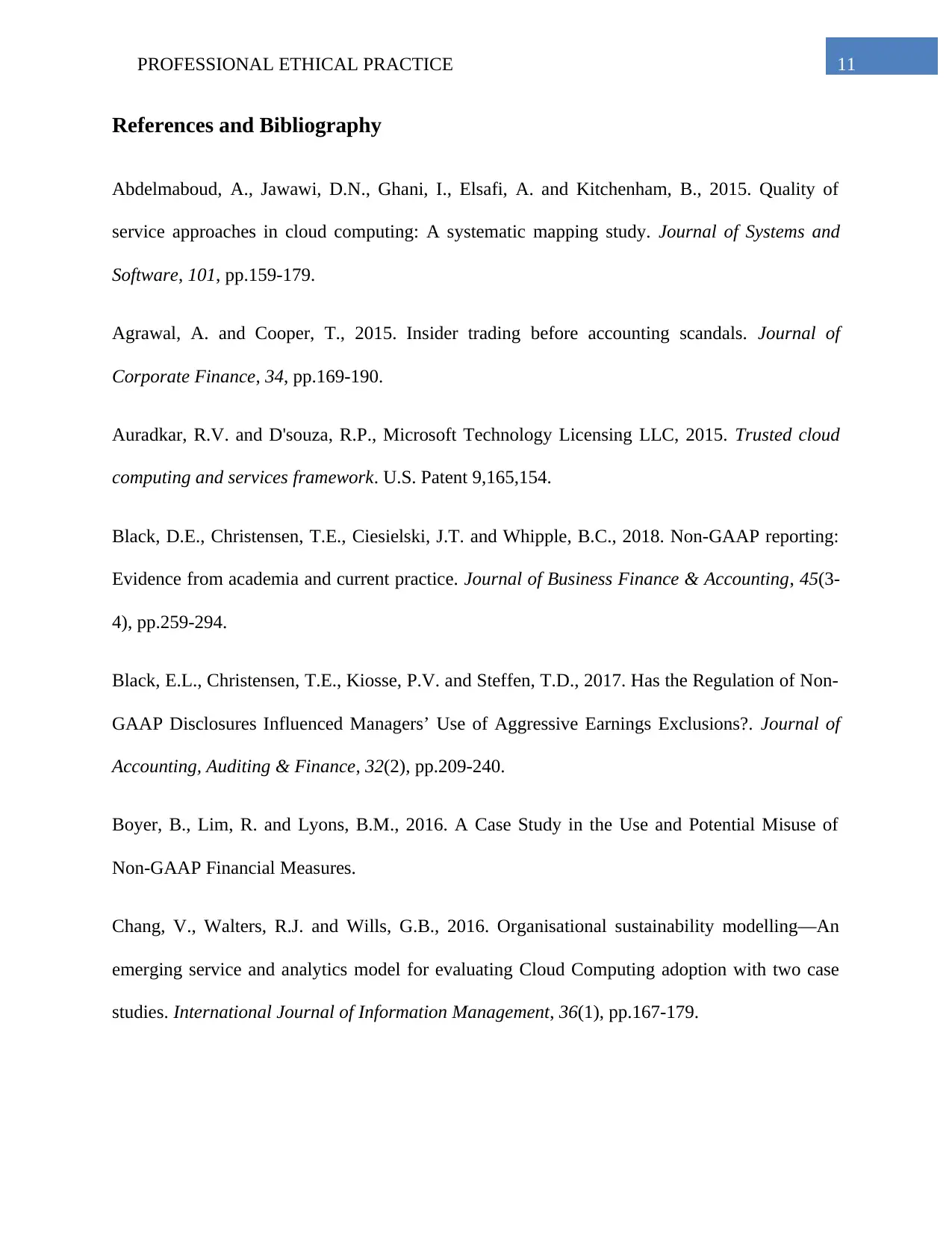
11PROFESSIONAL ETHICAL PRACTICE
References and Bibliography
Abdelmaboud, A., Jawawi, D.N., Ghani, I., Elsafi, A. and Kitchenham, B., 2015. Quality of
service approaches in cloud computing: A systematic mapping study. Journal of Systems and
Software, 101, pp.159-179.
Agrawal, A. and Cooper, T., 2015. Insider trading before accounting scandals. Journal of
Corporate Finance, 34, pp.169-190.
Auradkar, R.V. and D'souza, R.P., Microsoft Technology Licensing LLC, 2015. Trusted cloud
computing and services framework. U.S. Patent 9,165,154.
Black, D.E., Christensen, T.E., Ciesielski, J.T. and Whipple, B.C., 2018. Non‐GAAP reporting:
Evidence from academia and current practice. Journal of Business Finance & Accounting, 45(3-
4), pp.259-294.
Black, E.L., Christensen, T.E., Kiosse, P.V. and Steffen, T.D., 2017. Has the Regulation of Non-
GAAP Disclosures Influenced Managers’ Use of Aggressive Earnings Exclusions?. Journal of
Accounting, Auditing & Finance, 32(2), pp.209-240.
Boyer, B., Lim, R. and Lyons, B.M., 2016. A Case Study in the Use and Potential Misuse of
Non-GAAP Financial Measures.
Chang, V., Walters, R.J. and Wills, G.B., 2016. Organisational sustainability modelling—An
emerging service and analytics model for evaluating Cloud Computing adoption with two case
studies. International Journal of Information Management, 36(1), pp.167-179.
References and Bibliography
Abdelmaboud, A., Jawawi, D.N., Ghani, I., Elsafi, A. and Kitchenham, B., 2015. Quality of
service approaches in cloud computing: A systematic mapping study. Journal of Systems and
Software, 101, pp.159-179.
Agrawal, A. and Cooper, T., 2015. Insider trading before accounting scandals. Journal of
Corporate Finance, 34, pp.169-190.
Auradkar, R.V. and D'souza, R.P., Microsoft Technology Licensing LLC, 2015. Trusted cloud
computing and services framework. U.S. Patent 9,165,154.
Black, D.E., Christensen, T.E., Ciesielski, J.T. and Whipple, B.C., 2018. Non‐GAAP reporting:
Evidence from academia and current practice. Journal of Business Finance & Accounting, 45(3-
4), pp.259-294.
Black, E.L., Christensen, T.E., Kiosse, P.V. and Steffen, T.D., 2017. Has the Regulation of Non-
GAAP Disclosures Influenced Managers’ Use of Aggressive Earnings Exclusions?. Journal of
Accounting, Auditing & Finance, 32(2), pp.209-240.
Boyer, B., Lim, R. and Lyons, B.M., 2016. A Case Study in the Use and Potential Misuse of
Non-GAAP Financial Measures.
Chang, V., Walters, R.J. and Wills, G.B., 2016. Organisational sustainability modelling—An
emerging service and analytics model for evaluating Cloud Computing adoption with two case
studies. International Journal of Information Management, 36(1), pp.167-179.
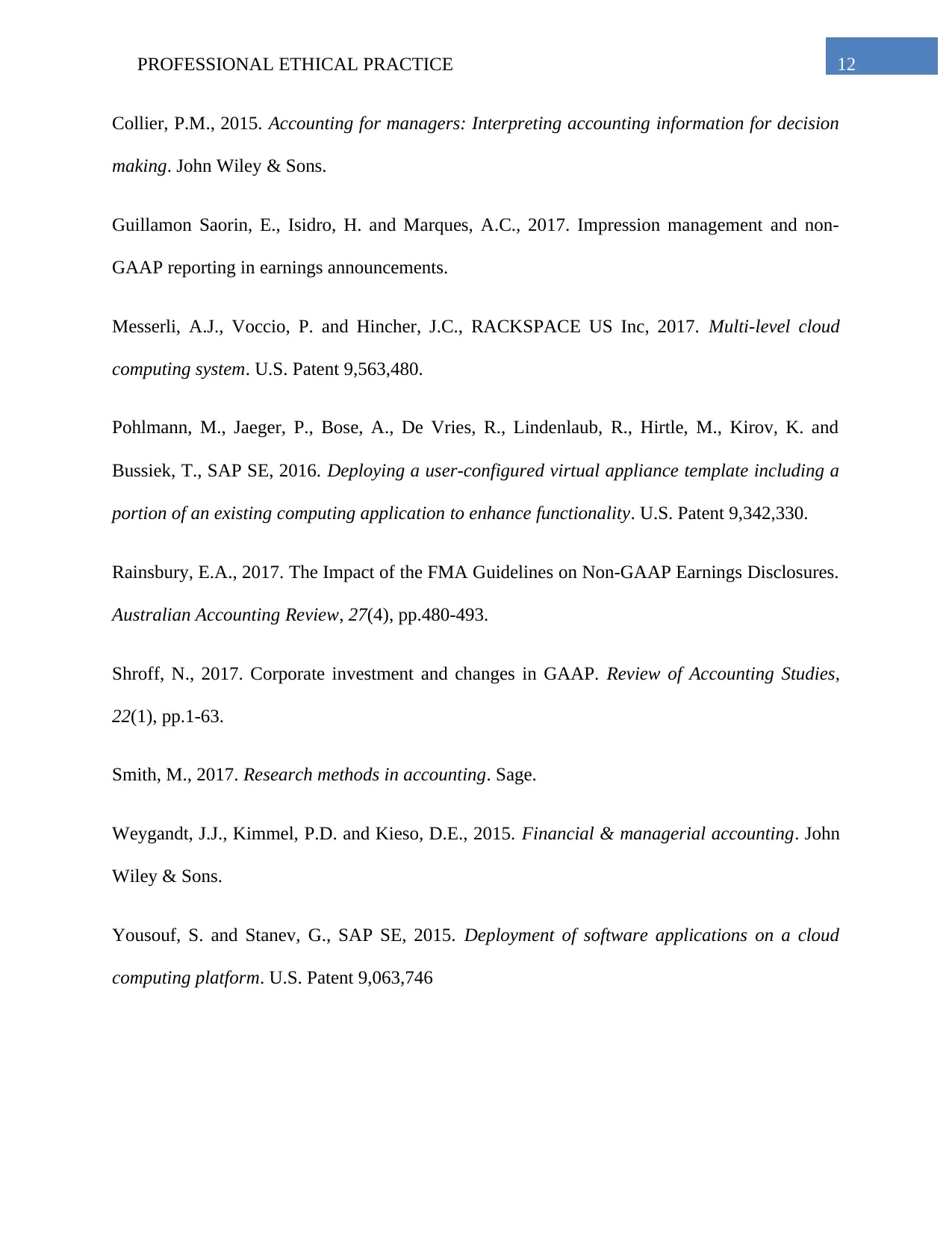
12PROFESSIONAL ETHICAL PRACTICE
Collier, P.M., 2015. Accounting for managers: Interpreting accounting information for decision
making. John Wiley & Sons.
Guillamon Saorin, E., Isidro, H. and Marques, A.C., 2017. Impression management and non-
GAAP reporting in earnings announcements.
Messerli, A.J., Voccio, P. and Hincher, J.C., RACKSPACE US Inc, 2017. Multi-level cloud
computing system. U.S. Patent 9,563,480.
Pohlmann, M., Jaeger, P., Bose, A., De Vries, R., Lindenlaub, R., Hirtle, M., Kirov, K. and
Bussiek, T., SAP SE, 2016. Deploying a user-configured virtual appliance template including a
portion of an existing computing application to enhance functionality. U.S. Patent 9,342,330.
Rainsbury, E.A., 2017. The Impact of the FMA Guidelines on Non‐GAAP Earnings Disclosures.
Australian Accounting Review, 27(4), pp.480-493.
Shroff, N., 2017. Corporate investment and changes in GAAP. Review of Accounting Studies,
22(1), pp.1-63.
Smith, M., 2017. Research methods in accounting. Sage.
Weygandt, J.J., Kimmel, P.D. and Kieso, D.E., 2015. Financial & managerial accounting. John
Wiley & Sons.
Yousouf, S. and Stanev, G., SAP SE, 2015. Deployment of software applications on a cloud
computing platform. U.S. Patent 9,063,746
Collier, P.M., 2015. Accounting for managers: Interpreting accounting information for decision
making. John Wiley & Sons.
Guillamon Saorin, E., Isidro, H. and Marques, A.C., 2017. Impression management and non-
GAAP reporting in earnings announcements.
Messerli, A.J., Voccio, P. and Hincher, J.C., RACKSPACE US Inc, 2017. Multi-level cloud
computing system. U.S. Patent 9,563,480.
Pohlmann, M., Jaeger, P., Bose, A., De Vries, R., Lindenlaub, R., Hirtle, M., Kirov, K. and
Bussiek, T., SAP SE, 2016. Deploying a user-configured virtual appliance template including a
portion of an existing computing application to enhance functionality. U.S. Patent 9,342,330.
Rainsbury, E.A., 2017. The Impact of the FMA Guidelines on Non‐GAAP Earnings Disclosures.
Australian Accounting Review, 27(4), pp.480-493.
Shroff, N., 2017. Corporate investment and changes in GAAP. Review of Accounting Studies,
22(1), pp.1-63.
Smith, M., 2017. Research methods in accounting. Sage.
Weygandt, J.J., Kimmel, P.D. and Kieso, D.E., 2015. Financial & managerial accounting. John
Wiley & Sons.
Yousouf, S. and Stanev, G., SAP SE, 2015. Deployment of software applications on a cloud
computing platform. U.S. Patent 9,063,746
1 out of 13
Your All-in-One AI-Powered Toolkit for Academic Success.
+13062052269
info@desklib.com
Available 24*7 on WhatsApp / Email
![[object Object]](/_next/static/media/star-bottom.7253800d.svg)
Unlock your academic potential
© 2024 | Zucol Services PVT LTD | All rights reserved.

